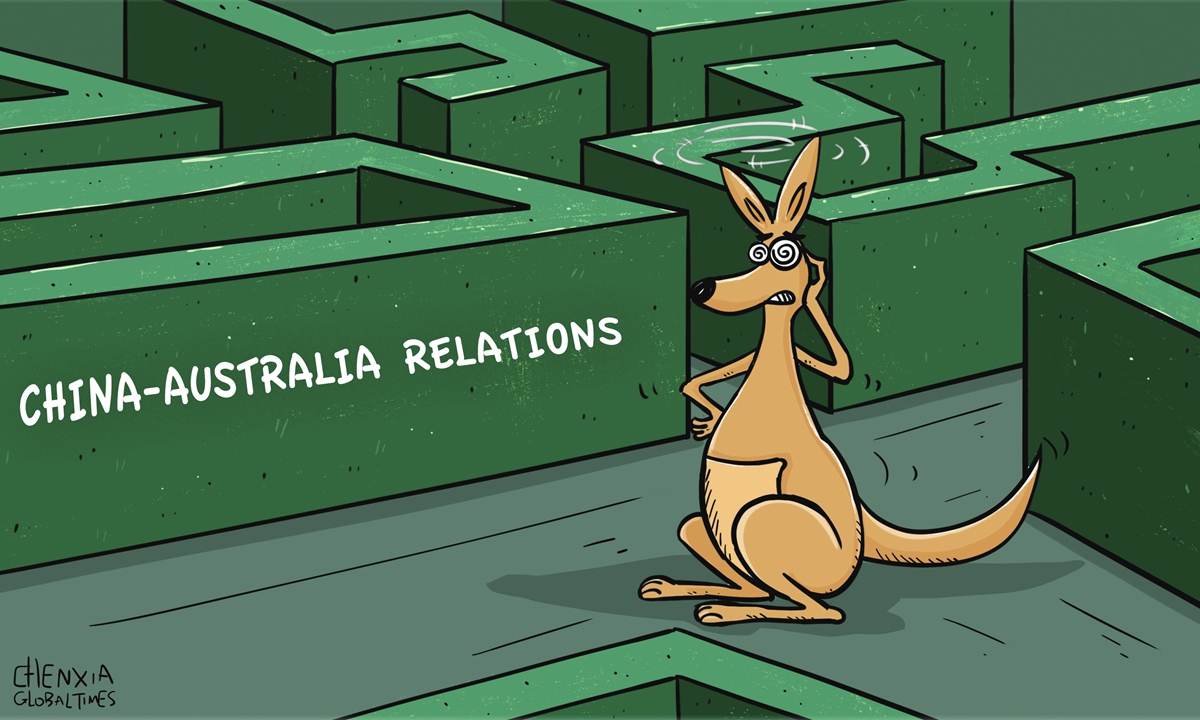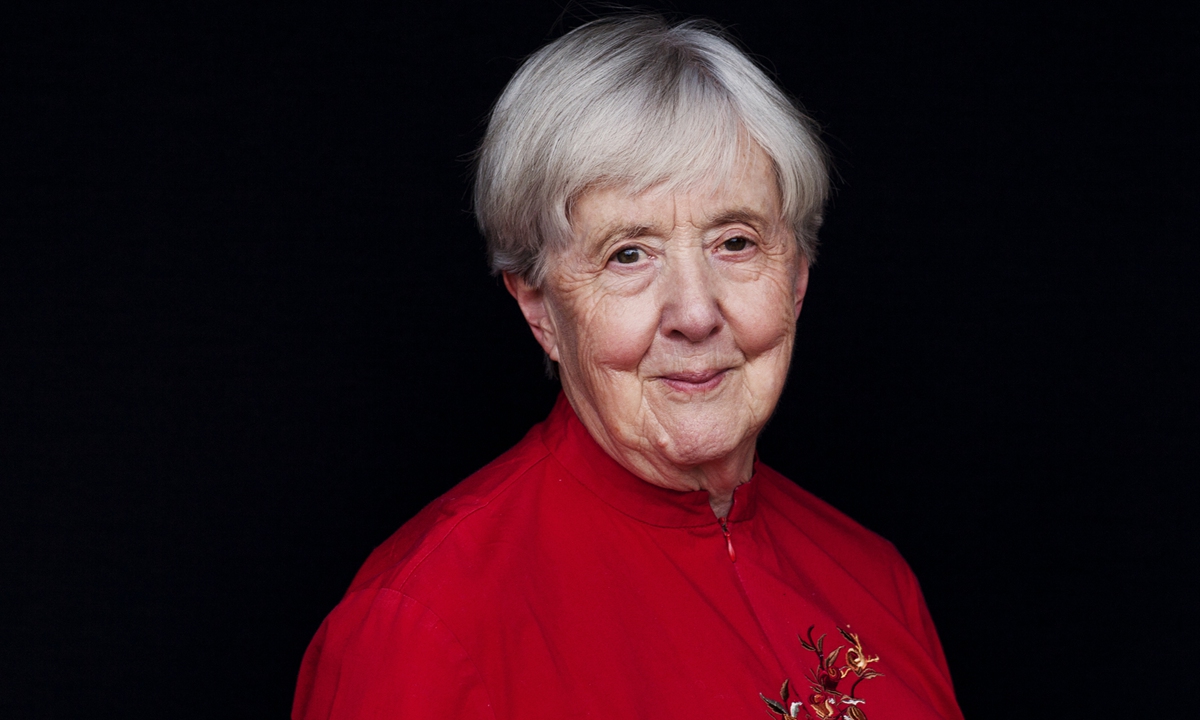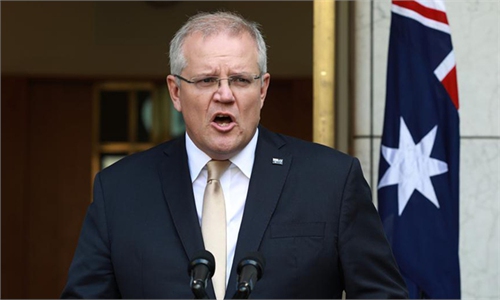
Illustration: Chen Xia/GT
Editor's Note:China-Australia relations are at their "lowest ebbs" ever. As the Morrison administration continues moves souring ties with China, many in Australia are thinking about figuring out their own way to rebuild relations with China. But what's really happening between Australia and China ties now in this light? How can the two countries bring their relationship back on track? Professor Jocelyn Chey (Chey), who formerly held diplomatic posts in Chinese mainland and Hong Kong, shared her views on these topics with Global Times (GT) reporter Xu Hailin via email. Professor Chey is now visiting professor at the University of Sydney and a member of the Order of Australia and a fellow of the Australian Institute of International Affairs.
GT: In the past months, you have repeatedly emphasized that the Australian government should keep calm when dealing with China. You have even said that some leaders and media are "crying wolf." Why do you have such opinions?
Chey: It has always been my belief that people should not rush to judgment. Most quarrels can be avoided if the disputants can be persuaded to listen to each other and engage in mediation. Unfortunately, in recent years, this age-old advice is increasingly dismissed. Too many people jump to conclusions and are instant experts. In the past, people usually believed what they read in the traditional media (print, radio and television) - not that these were infallible - but today, most people, particularly the younger generations, rely on internet searches and social media as their sources of news. Unfortunately, social media often over-simplify or distort facts. (It has been social media, for instance, that has been responsible for spreading conspiracy theories about COVID-19 and about vaccinations.) They are mainly responsible for spreading misinformation about China derived from questionable sources.
Younger generations may regard me as old-fashioned or fuddy-duddy, but I believe that I have a duty to insist that people check rumors and gossip, refrain from spreading them, listen to both sides of every story, maintain open minds and "seek truth from facts." In July this year I joined Dr David Brophy of the University of Sydney in an online discussion on "China: A big threat to our future or a misunderstood hegemon?"
This discussion was aimed at a general audience, so I used the well-known Aesop fable to remind the audience that they should investigate the facts concerning the shepherd boy, the villagers and the wolf. The title of my talk "Crying Wolf" should not be interpreted simply to mean that our leaders and the media are making false accusations. The transcript of my talk shows that I quoted Samuel Croxall, who translated Aesop into English in the 18th century. For Croxall, the moral of the fable was that people should distinguish between real and imaginary dangers.
GT: In your speech given in an online panel on Law, Justice and Diplomacy on September 22, you said that, "differences and difficulties can be resolved through dialogue." But clearly China-Australia relations have recently failed to be remedied in that way. Why has Canberra's diplomacy in recent years been dominated by defense and security? Why does the Morrison administration prefer "microphone diplomacy"?
Chey: Most of my working career has been in the practice of foreign trade and diplomatic relations. The purpose of diplomacy is usually described as being to enhance one's nation, to advance its interests and to do this without using force or causing negative reactions. Not surprisingly, my online presentation on September 22 was part of a "Raising Peace Festival," and in it I maintained those principles, and said that "difference and difficulties can be resolved through dialogue." The Australian Department of Foreign Affairs and Trade claims that it "promotes and protects Australia's international interests to support our security and prosperity." I believe it has failed in this objective. Unfortunately, our foreign policy debate agenda is now being set by security agencies rather than by our professional diplomats. Because of this, I agree with former Prime Minister Paul Keating's comments who said on November 10 that Australia has "lost its way."

Jocelyn Chey Photo: Courtesy of Chey
GT: We have noticed a lot of voices in Australia calling for the preparation for war with China. They call for the pounding "drums of war." Why has Canberra hyped a war, portraying itself as belligerent? In your opinion, are Australian leaders influenced by personal interests? Or is it because Canberra's diplomacy has been kidnapped by US interest groups?Chey: [Former US President] Donald Trump beat up fear of China as part of his last election campaign. Now, our own federal government election will be held in the next few months. The Liberal coalition government is therefore happy to promote fear of a foreign threat and engineer a "khaki" election. In other words, they are spreading the idea that we need to re-elect them in order to protect our way of life.
The phrase "drums of war" was used by Mike Pezzullo, Secretary of the Department of Home Affairs, in April this year in an internal message to his staff. A year before that, Major-General Adam Findlay said conflict with China was a "high likelihood" in a private briefing. Both statements were leaked to the press. One can only speculate by whom and for what purpose. I do not think the Liberals' fear-mongering will be effective. International affairs rarely affect the outcome of elections in Australia. The public certainly does not want to engage in a foreign war.
Australia's relations with the United States of America are governed by the 1951 ANZUS treaty. Every Australian government since then has endorsed this. Naturally, under the terms of this treaty, our defence and security departments have close relations with their American counterparts. ANZUS commits us to coming to the aid of the US in the case of an attack on their forces, not an attack by their forces, but over the last decade, Australian military forces have become more and more a kind of auxiliary force capable of being deployed to meet US requirements. At the same time, more joint facilities have been set up for conventional military operations, counterterrorism and even space warfare. The increasing closeness of the relationship can be seen from the recent decision to cancel an order for French submarines and replace it with nuclear-powered subs from either the UK or the US.
GT: You've said that Australia's trade disputes with China should be resolvable through the WTO. But it was destroyed by the Trump administration. In the meantime, many shares in the Chinese market that originally belonged to Australia were taken by American companies. What are averages Aussies' opinions about this allied America?
Chey: The WTO was seriously damaged by Donald Trump's administration, but, together with the GATT, it remains the only global organisation capable of regulating international trade. Australia, as a trading nation, highly respects international trade rules and is committed to the WTO and its framework. If there are trade disputes between Australia and China that cannot be resolved by direct discussion and negotiation, they are best referred to an independent arbiter. December of 2021 will be the 20th anniversary of China joining the WTO. As China's leaders said, on the occasion of the tenth anniversary, China's accession was a sign that it was making "a full embrace of the world"
The Comprehensive and Progressive Agreement for Trans-Pacific Partnership (CPTPP) is also a key trade arrangement in which China and Australia can both play key roles. I hope that China will shortly become a full member. APEC also provides a useful forum for trade ministers to meet. The APEC virtual meeting in November this year has discussed phasing out fossil fuel subsidies and lowering tariffs for "green" goods. These will be positive steps towards meeting the environmental goals of COP26.
GT: In the 1970s, you went to Beijing in charge of educational, scientific, and cultural exchanges. You said, "At that time Australia had more innovative and productive relations with China than any other Western country." The relationship between China and Australia has indeed developed steadily ever since. Now the ties are at their "lowest ebbs" ever. Do you think the two countries can regain those innovative, productive relations again? What should the two countries do now?
Chey: In 1972, Prime Minister Gough Whitlam took the decisive step of establishing diplomatic relations with China. He believed that Australia should develop an independent foreign policy that was appropriate to a middle power located geographically in the Asia-Pacific region. His policies were widely supported by our educational, scientific and cultural institutions, and they seized the opportunity of initiating exchanges with their counterparts in China. Those exchanges have been very productive. There are now strong grassroots links and many collaborative programs that have benefited both countries.
In the last two years, these exchanges have been affected greatly by travel restrictions due to COVID-19 and by the tense political atmosphere, but there is still much goodwill among ordinary citizens, and impatience on both sides to resume normal contacts. We should start by developing cooperation in areas of crucial concern, for instance, in medical research and global health, in environmental science, agricultural innovation, AI. Global problems need global solutions and there is no time to lose.


